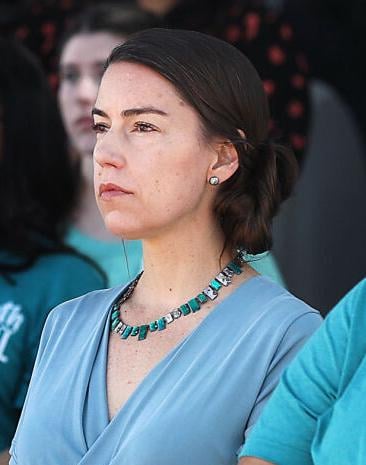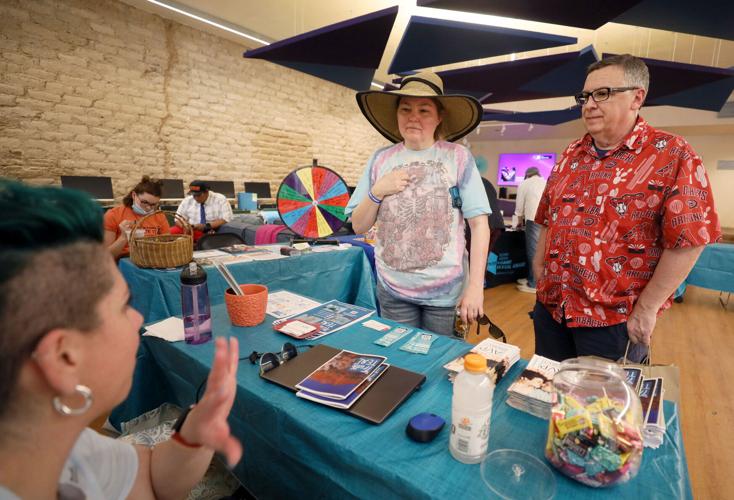With a sexual assault taking place nearly every minute in the United States, agencies and community groups across Pima County are teaming up this month for outreach and events designed to support survivors and fight misinformation.
TucSAAM, Tucson's version of April's Sexual Assault Awareness Month, started last year when local victim service agencies, advocacy groups, law enforcement and legal rights organizations came together with the idea of informing the public while also supporting survivors of sexual assault, through virtual education events, digital campaigns and online outreach.
But with COVID-19 precautions winding down and in-person events ramping up this spring, organizers are working on a month full of in-person events and outreach across Tucson. The theme of this year's campaign, "The Truth About Teal," (the color associated with Sexual Assault Awareness Month,) aims to dispel myths surrounding sexual assault and provide factual information about the scope of the problem and its impact on survivors.
Someone in America is sexually assaulted every 68 seconds, and one out of every six American women has been the victim of attempted sexual assault or rape, according to the Pima County Attorney's Office. And with less than one-third of assaults being reported to police, more needs to be done to break down the barriers to reporting, local experts say.
With two-thirds of transgender people having been sexually assaulted and at least one in 33 men having been the victim of an attempted sexual assault or rape, experts are clear that anyone can be a victim.
TucSAAM 2022 officially kicked off Friday, with representatives from the Southern Arizona AIDS Foundation inviting people at the Fourth Avenue Street Fair to come into the Thornhill Lopez Center, SAAF's safe space for LGBTQ+ youth, for water and information about local resources and facts about sexual assault.
New to the group this year, SAAF's Anti-Violence Project program director Carrie Eutizi designed the marketing materials used during this year's campaign. That includes a bookmark with local resources that's being distributed at several Pima County libraries and Bookmans locations here. Bookmans, along with the libraries also will have displays up that have information about local resources and a recommended list of books that can help people better understanding the survivor experience.
Bookmans also is bringing author Karen Moe, a sexual assault survivor who wrote a book about being abducted by a serial rapist in Prescott in 1994, to talk about her experience and promote her new book.
"While I thought that was a great idea, I did want to focus on a few more local resources for our community," said Bookmans' Community Manager James Robertson. "It's easy to hear a story and things of that nature, but in my opinion, it's always better to have something local you can turn to if you have questions about what our community can offer in those situations."
Getting resources into libraries is a big step toward reaching survivors, organizers say.

"The (libraries) experience people in crisis all the time," said Molly Hilber, grants and contracts manager for Pima County Behavioral Health. "One of the materials they wanted the most copies of was the list of crisis service lines for all our partners."
A similar display will also be up at the UA library, thanks to community outreach professional Cynthia Chapman, who works with the UA's Consortium on Gender-Based Violence and is part of an on-campus Sexual Assault Response Team that started last year.
The group is working with the campus medical team and residence advisors to get the word out about this year's efforts to dispel myths about sexual assault and let students know about campus resources available to survivors.

Danielle Rheault, center, and Kevin McArdle, listen to Carrie Eutizi, of Southern Arizona AIDS Foundation, talk about services at the Thornhill Lopez Center on 4th. For the first time, Tucson law enforcement agencies and advocacy groups are teaming up for April's Sexual Assault Awareness Month and plan to hold in-person events to help dispel myths about sexual assault.
A communitywide campaign
It's been a long road for the parties involved to arrive at a communitywide campaign like TucSAAM, said Colleen Phelan, a victim advocate with the Pima County Attorney's Office.
Phelan says she never thought she'd see such an outpouring of support for survivors. Tuesday's official kick-off included Mayor Regina Romero, Pima County Attorney Laura Conover and Monica Prieto, an assistant chief in the Tucson Police Department.
More than 50 people turned out for the event, many of whom were representing the 30 local organizations involved in Pima County's Sexual Assault Response Team.
Most of the crowd sported TucSAAM t-shirts or teal clothing and accessories, including Conover and Romero, who said the Southern Arizona Center Against Sexual Assault was the first Tucson board on which she volunteered and holds a special place in her heart all these years later.
"We're gathered in power today to have difficult conversations so we can unburden survivors of sexual assault, and specifically so that we can support marginalized communities where incidents of sexual assault are pervasive," Romero said. "It's not that members of marginalized communities can't speak for themselves, it's just that it's harder to own your space when others are intent on demeaning your gender identity, your ethnicity, your language or your legal status."
Prieto talked about her experience working in TPD's adult sexual assault unit, saying that she's been impressed with the progress the department has made over the last decade in terms of educating officers on using a trauma-informed approach when interacting with survivors.
"Tucson police has been diligent in relaying the message … that trauma impacts everyone differently," Prieto said. "Our primary role is law enforcement, but we know that justice isn't all that's needed."
Prieto said she's grateful for the team effort to address sexual assault in Pima County, saying it's broken down silos, allowed for members to learn from each other's mistakes and brought survivors to the forefront of their efforts.
"My dream is to have educated juries, and the only way to get educated juries is if we talk about sexual assault," Phelan said. "The only way we talk about sexual assault is if we have things like this that make the community see this is OK to talk about."
Deputy Pima County Attorney Victoria Otto, who works in the office's special victims unit, said she'd like to take that dream a step further and no longer need juries, because the community is full of children, teens and adults who are educated about consent.
"If you want to tell your child don't have sex, OK fine," Otto said. "But it is also really important to start really early with 'When we say, we use our words and not our hands and we don't touch other people without their permission, that continues throughout your whole life.' That silence is not consent, that passivity is not consent. That if someone is just laying still, that is not consent."
Otto said that historically, the group has been mostly reaching out to people who are already engaging on the issue, so she was pleased to see more communitywide events and participation this year.
This includes young people. SAAF's Vanessa Delgado is working to create youth workshops and activities for Take Back the Night Tucson, an annual event celebrated worldwide to speak out against sexual violence, raise awareness and support survivors of assault. She said she's been working with the group to create youth activities and workshops for kids and teens at the April 19 event.
SACASA director Kaitlyn Monje said she's been incredibly impressed with the diversity of events the group has planned throughout the month.
"The only chance we have at really making an impact is to have the difficult conversations and stop sweeping these kinds of things under the rug," she said.
With SACASA often seeing an uptick in survivors calling their crisis line in April because of the emphasis put on sexual assault, the group is always looking for volunteers, as is the county attorney's victim advocate program.
While the statistics for reporting sexual assault have improved, there's still a long way to go, said Mary Pekas, a detective in the Tucson Police Department's adult sexual assault unit.
"There was a time when 75% went unreported, and now we're closer to about 66%," Pekas said. "That pales in comparison to other major crimes."
Pekas says she is hoping this year to bust the myth that police are always the first to be called by people who are sexually assaulted.
"I talk to people who are reporting these things to police and have an understanding of what happens," she said. But many times survivors will call a parent or friend — someone they trust and that cares about them — before calling the police, Pekas added.
"They want to be comforted," Pekas said. "Even if they are the kind of person who reports things to police, in that moment, sometimes they're not."






